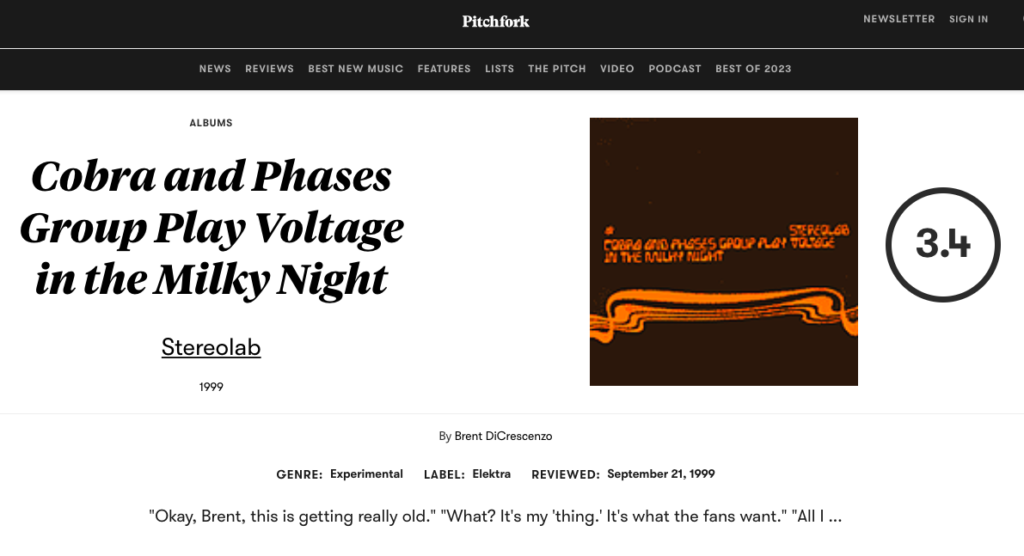Last week, media company Condé Nast revealed its plan to reorganise Pitchfork, the leading music site, by merging it with men’s magazine GQ. A round of layoffs followed. Editor-in-chief Puja Patel, executive editor Amy Phillips and staff writer Marc Hogan were among those who had to leave.
Naturally, the reformation of Pitchfork is perceived by many music writers and readers as the death of the digital publication. The apprehensive impression is coloured by recent news about similar layoff schemes at Bandcamp, Spotify and Tidal. The grim scenario looming over the independent music industry does not help to imagine anything different. A few years back, music journalism was shaken by the closure of Q magazine in 2020 and the loss of the printed version of NME who stopped producing a weekly magazine in 1998. So Condé Nast calling it a day for Pitchfork wouldn’t come as a big surprise.
One of the long-standing online publications, Pitchfork has been influential. Launched by Ryan Schreiber in 1996, it gradually evolved from a digital fanzine to a professional site with an international pool of writers. It is said to have boosted the careers of such contemporary indie giants as Arcade Fire, Sufjan Stevens, Clap Your Hands Say Yeah, Interpol, the Go! Team, Junior Boys, the Books, Broken Social Scene, Cold War Kids, Wolf Parade, Tapes ‘n Tapes, and Titus Andronicus.
Unlike its current sleek version, Pitchfork circa the late 90s and early noughties specialised in sharp-tongued reviews, written in an unconventional (often conversational) manner. Balancing between a comic strip, a script for a play and draft for a fanzine review, the piece about Stereolab’s album Cobra and Phases Group Play Voltage in the Milky Night is a flow of arrogant humour and obnoxious stream of consciousness (Mr. DiCrescenzo, were you a music writer now, you would perhaps appreciate things in a very different way). Reviews rating albums (often unjustified) at 3 or 4 (and even 0) out of 10 were not rare on Pitchfork. Since its inception, 873 reviews have been awarded a rating of less than 5. The belittling tone of its writers became somewhat the publication’s schtick. The digital footprint on some forums reveals the outrage of music fans frustrated about extremely negative reviews.

Later on, they mellowed out. Critics like Brent DiCrescenzo or Rob Mitchum went their ways, with the former, quite predictably, becoming a scriptwriter and the latter moving on to science journalism. Still, the publication and the team haven’t been shy to say what they actually think. A rare and unprecedented stance in the world where many online sources are very cautious and have almost worship-like relationships with labels, publicists and PRs.
It would also be fair to say that Pitchfork have been an outlet that stood out from many music sites, often relying on copypasting and rephrasing cliches. In the interview with Billboard, DiCrescenzo admits that record reviews have never been really his cup of tea: “It sounds weird to say, considering I reviewed music for a living for years, but I kind of hate record reviews. They are formulaic and rely on oddly canonized vocabulary – nobody talks like this in real life. So, I wanted my reviews to make the reader feel [how] the record made me feel. If the record made me laugh, I’d try to make the audience laugh. If the album made me emo, I would go heart-on-screen. Kid A [Radiohead’s album] immediately awed and excited me and made me want to gush about it.”
After the publication was bought by media giant Condé Nast in 2015, it had to adjust to its new unlikely home (also home to glossy mags like Vogue and GQ). The decision to lay off the staff and merge the music site with the men’s magazine was announced by Anna Wintour, Condé Nast’s chief content officer and global editorial director of Vogue, who reportedly kept her trademark sunglasses on during the meeting. Given the differences between the publications, that is Vogue and Pitchfork, the clash of ideas conjures up allusions to the antagonism between youth subcultures, namely fights between mod and rockers in early 1960s Britain.
Regardless of the obnoxious stance of its writers in the past or better-tempered tone now, the loss of Pitchfork would be unpleasant for many music enthusiasts and industry professionals. The opinion of Pitchfork mattered. Although its development within GQ is not clear, it will certainly be another publication. In his Pitchfork appreciation feature, former staff journalist Marc Hogan wrote: “I am rooting hard for my brilliant and talented former colleagues who remain at Pitchfork. We need their work now as much as ever, but it’s hard to see how doing it will get anything but more difficult.”



